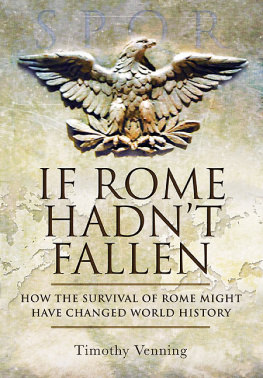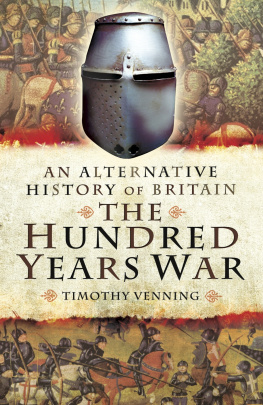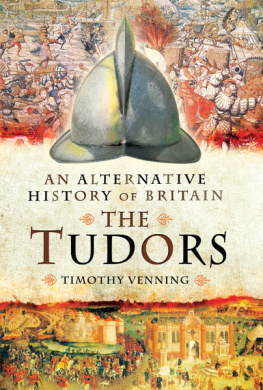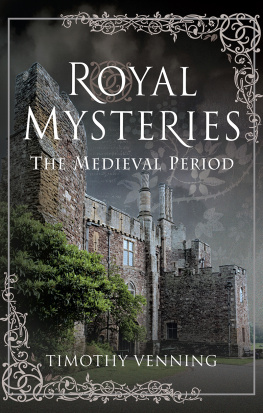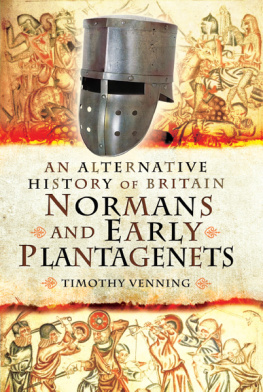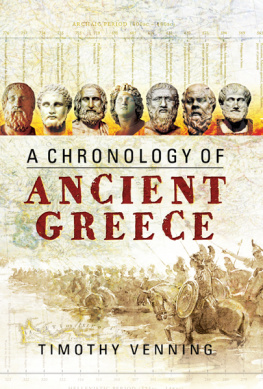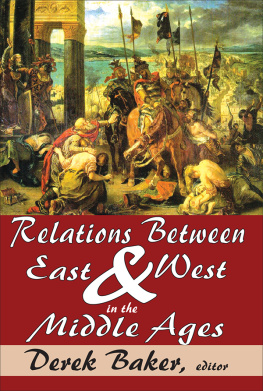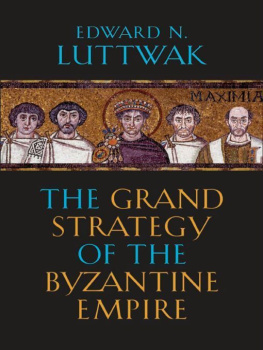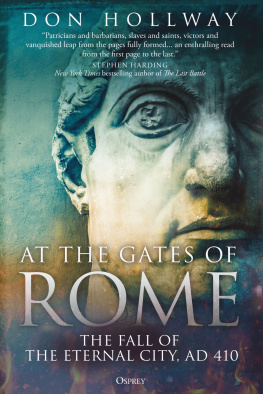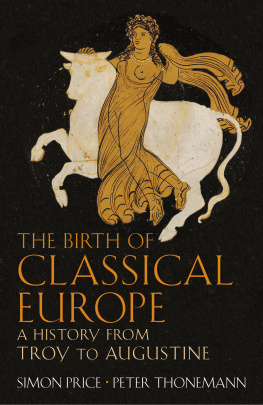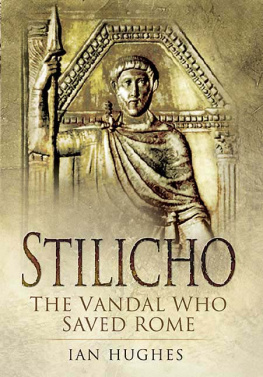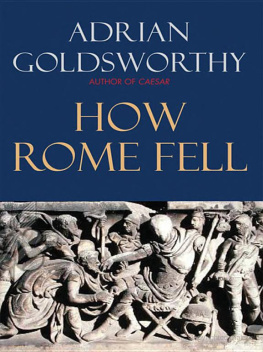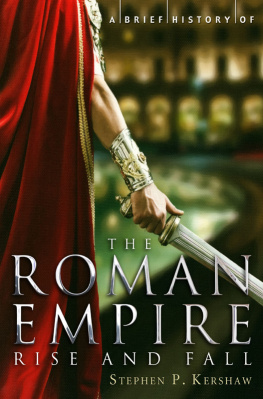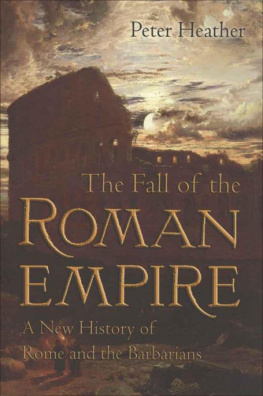
First published in Great Britain in 2011 by
Pen & Sword Military
an imprint of
Pen & Sword Books Ltd
47 Church Street
Barnsley
South Yorkshire
S70 2AS
Copyright Timothy Venning 2011
ISBN 9781-84884-429-2
ePub ISBN: 9781848849020
PRC ISBN: 9781848849037
The right of Timothy Venning to be identified as Author of this Work
has been asserted by him in accordance with the Copyright, Designs and
Patents Act 1988.
A CIP catalogue record for this book is available from the British Library.
All rights reserved. No part of this book may be reproduced or transmitted in
any form or by any means, electronic or mechanical including photocopying,
recording or by any information storage and retrieval system, without
permission from the Publisher in writing.
Typeset in 11pt Ehrhardt by
Mac Style, Beverley, E. Yorkshire
Printed and bound in the UK by MPG
Pen & Sword Books Ltd incorporates the Imprints of Pen & Sword Aviation,
Pen & Sword Family History, Pen & Sword Maritime, Pen & Sword Military,
Pen & Sword Discovery, Wharncliffe Local History, Wharncliffe True Crime,
Wharncliffe Transport, Pen & Sword Select, Pen & Sword Military Classics,
Leo Cooper, The Praetorian Press, Remember When, Seaforth Publishing
and Frontline Publishing.
For a complete list of Pen & Sword titles please contact
PEN & SWORD BOOKS LIMITED
47 Church Street, Barnsley, South Yorkshire, S70 2AS, England
E-mail:
Website: www.pen-and-sword.co.uk
Contents
with summary of nine turning points and
nineteen speculated consequences
Chapter 1 : Two Reasons for Romes Problems Did They Make
Collapse More Likely? Were They Avoidable?
Overview of real-life history. Decline and fall, how much has it been exaggerated, and was it inevitable? Problems of state structure and control. Religion, governance, and failings in the structure of the bureaucracy. Division of the Empire, militarily necessary, or extra problems? The state and the army: too heavy a burden, or irrelevant to the question of survival? Germans and Romans. 476, a convenient but misleading date? A vicious circle of gradual collapse? Potential alternatives and the crucial moments of Roman collapse.
Earlier What Ifs: the crises that led to the creation of the later Empire.
The Empires problems in the third and fourth centuries. How might they have been reduced by earlier military successes?
What would have been the likely developments in the Western Empire had one of the foregoing scenarios occurred?
Acknowledgements
Thanks are due to the staff who created the Trigan Empire comic strip for Ranger and subsequently Look and Learn magazine, which first gave me the concept of what if fantasy when I was at primary school in the late 1960s. This innovative science-fiction series showed what a Roman-type civilization might have looked like if it had survived to the Space Age, particularly due to the artwork of Don Lawrence. My exploration of the scenarios took off from there.
Introduction
The question of how much the course of history is dependent on personality and chance has always been a pertinent one. Historians have disagreed to what extent the outcome of events in shaped by broad social and economic developments as opposed to the quirks and decisions of strong individuals, and some have held it fashionable to downplay the effects on the mass of people of political and military struggles among those in authority. Dates and lists of rulers, once the staple of learning history in schools, were replaced in the 1960s and 1970s by studies of the lives of the ordinary people and the social, economic, and cultural factors that shaped their existences rather than the intricate and remote political events in their countries capitals. But in recent years there has been a degree of reaction to that, with more recognition that individuals are not always powerless to shape the outcome of major events. One persons actions can alter the course of history, and a political or military mischance can touch off a catastrophic reaction that has repercussions over centuries. The geo-physical theory that a butterfly beating its wings in one continent can ultimately cause a hurricane in another one can have its counterpart in history. Whatever the importance of broad social or economic trends on the development of society, ultimately the safe existence and prosperity, and in many turbulent periods the lives, of the ordinary citizens depend on the nature and stability of the political structure of their states.
It is political and military leadership that determines the outcome of political struggles and military campaigns which decide whether a state survives and prospers or falls victim to its own feuding or its enemies conquest. The nature of personal leadership is as crucial as the social and economic circumstances that give a state its strength or its weakness and enable these people to fulfill or fail in their struggles. This was particularly the case in constantly competing and threatened states, where warfare and conquest were the norm before the rise of a relatively stable international system of determining relations. Again, before the rise of a complex system of bureaucracy much depended on the personal leadership (or not) of the rulers, and one wrong decision on the battlefield or the untimely death of a charismatic leader could plunge a nation or an empire into decades of crisis.
Still important over much of the world today, these factors were particularly apparent in the Ancient World with its constant political flux between a multiplicity of dynastic kingdoms, city-states, and nomadic peoples. Both internal and external factors could easily bring a fragile state to chaos, and undermine the most extensive and politically cohesive one. Despite the powerlessness of any ruler and the limitations of his ambitions in the face of a natural disaster such as drought or an epidemic, a human mistake could be just as catastrophic particularly in the event of invasion or a potential civil war.
The career of Alexander the Great provides the most notable example of the effect of one personality on the fortunes of peoples from the Balkans to the Punjab. The uncertain outcome of the titanic battles he was engaged in also invites the natural response. What if things had gone another way in one of them and a chance arrow or sword-thrust had cut his career short? It nearly did on two particular occasions, when Cleitus saved him at the battle of the Granicus at the start of his Asian campaigns in 334 BC and when he was shot down in an Indus valley town in 326. The premature death of Alexander at the height of his triumphs has also long begged the question of what would have happened if he had continued his career and not died at 32, with the nature of his future plans from June 323 only known in uncertain detail. This led to the first serious What if ? scenario of classical history on the subject of what might have happened if Alexander had lived longer, by Arnold Toynbee, based on a question first posed by Livy. His optimistic scenario had Alexander living to the approximate age of his grandfather Amyntas III and various of his own generals who died in their beds (i.e. dying in 287 at the age of 69) rather than his father Philip, assassinated at 46/7. Alexander would supposedly have gone on to conquer Carthage, India, and China and create a worldwide empire of provinces linked by trading and military co-ordination, ripe for conversion to the new religion of Buddhism in the third century. This is perhaps a little implausible, but the basic point is sound, that a long reign for the creator of a new order could have created a long-standing new empire in the same manner as Cyrus and Darius did in Persia in the sixth century BC.

